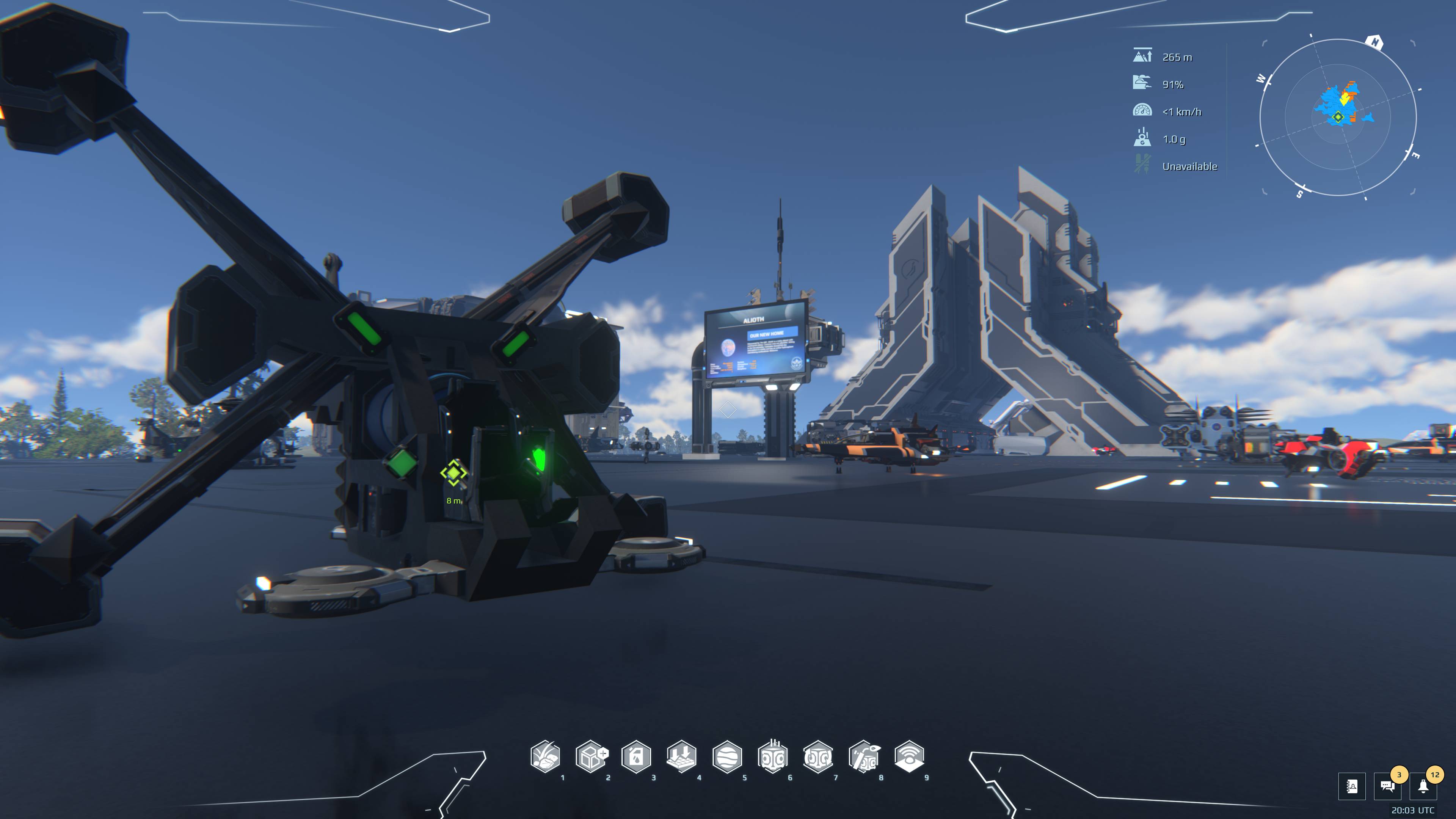Our Verdict
There's a decent space sim buried within Dual Universe, but you'll need to do a lot of digging to find it.
PC Gamer's got your back
What is it? A space sandbox that lets you establish your own industries and trade in a player-driven economy
Expect to pay: £10.49/$15 per month
Release date: Out now
Developer: Novaquark
Publisher: Novaquark
Reviewed on: AMD Ryzen 5 3600, Nvidia GeForce 2080 Super, 32 GB RAM,
Multiplayer? Massively
Link: Official site
My first attempt to reach space in Dual Universe ended in disaster. I'd purchased a space bike, which is the cheapest space-viable craft Novaquark's ludicrously ambitious space sim offers, with the intent of doing a test flight from the planet Alioth to one of its nearby moons. But through a combination of ignorance and ineptitude, I failed to escape the planet's gravitational pull, and ended up crashing 60 kilometres away from the nearest transportation.
In Dual Universe, distance is measured at a 1-to-1 scale, and without the resources to repair my bike, I was faced with the prospect of a two-hour trek back to civilisation. Having already battled with the game's byzantine systems at seemingly every turn, I was tempted to bin it off completely.
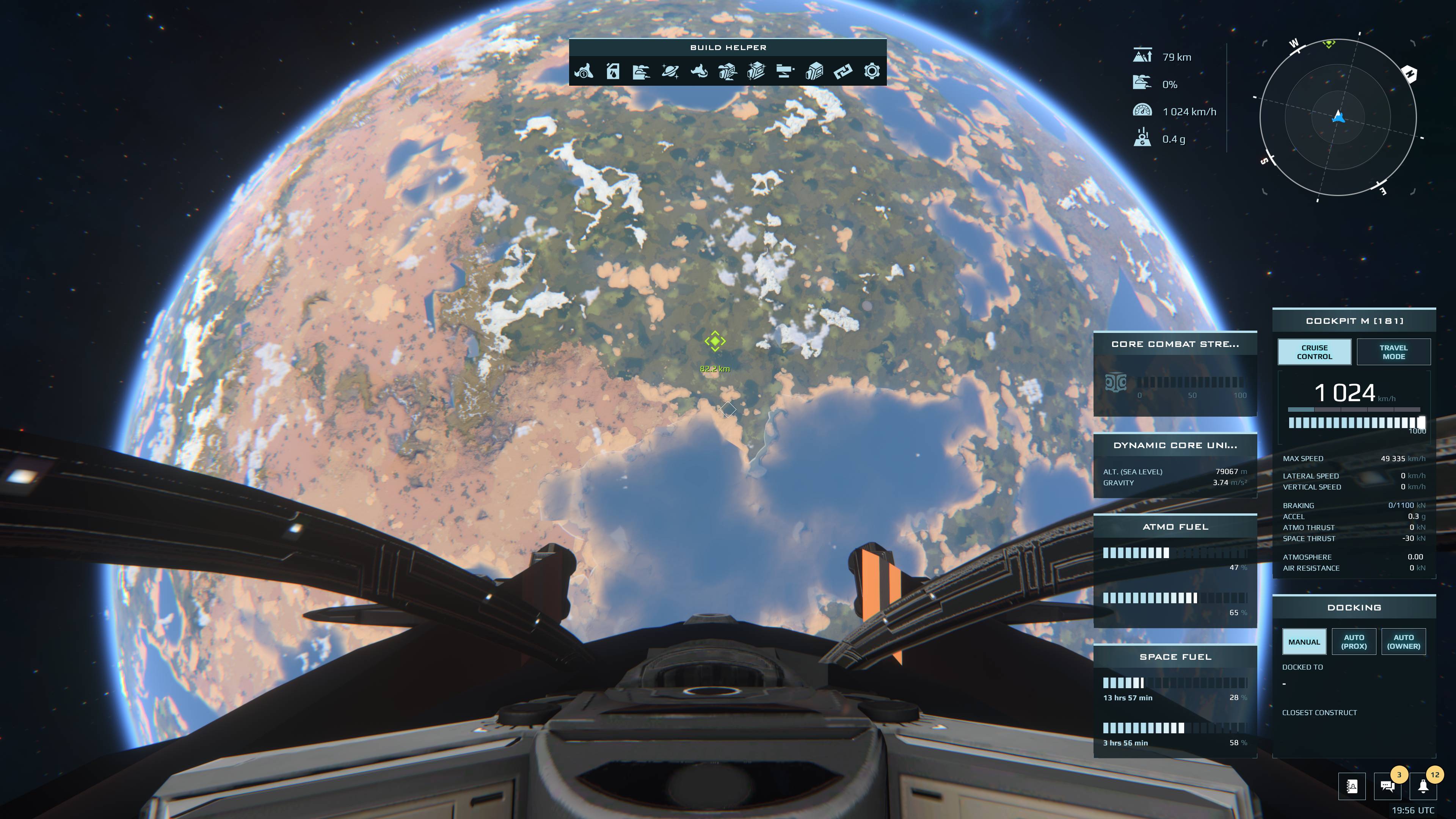
After sulking for a bit, I sat back down and got on with it. And while not exactly thrilling, that long journey home proved more interesting than I had anticipated. You see, Dual Universe's planets and major moons are not environmentally uniform, and as I travelled I passed through wind-sculpted deserts, lush forests, and meadowy plains. I also saw many player-built structures, ranging from starting prefab houses to elaborate industrial complexes, all with spaceships parked nearby. At one point, I spent fifteen minutes travelling across the bottom of a lake, and encountered several player installations that had been built beneath the waves.
It gave me a sense of what had been going on elsewhere in the world, and by the time I finally returned to civilisation, I was inspired to keep going. And this kind of encapsulates what playing Dual Universe is like. It's a wilfully obscure, regularly frustrating, and arguably unfinished experience. But hiding beneath the tangled mess of its many systems are moments of vision.
Sky's the limit
Broadly speaking, Dual Universe is a hybrid of EVE Online, No Man's Sky, and Factorio, with a little bit of Minecraft thrown in for good measure. It aims to be a fully simulated, player-driven sandbox, giving players the tools to build their own structures, design their own ships, and create their own interstellar enterprises that form part of a dynamic economy.
You literally drop into this universe as a lone pioneer, given a chunk of territory to claim as your own on the game's starting moon of Haven, before descending to your chosen plot via orbital dropship. You then set up your starter habitat (I picked a flash futurist villa with its own miniature runway) deploy your starting vehicle, a speeder, and get a crash course in how the game's voxel-based creative tools work.
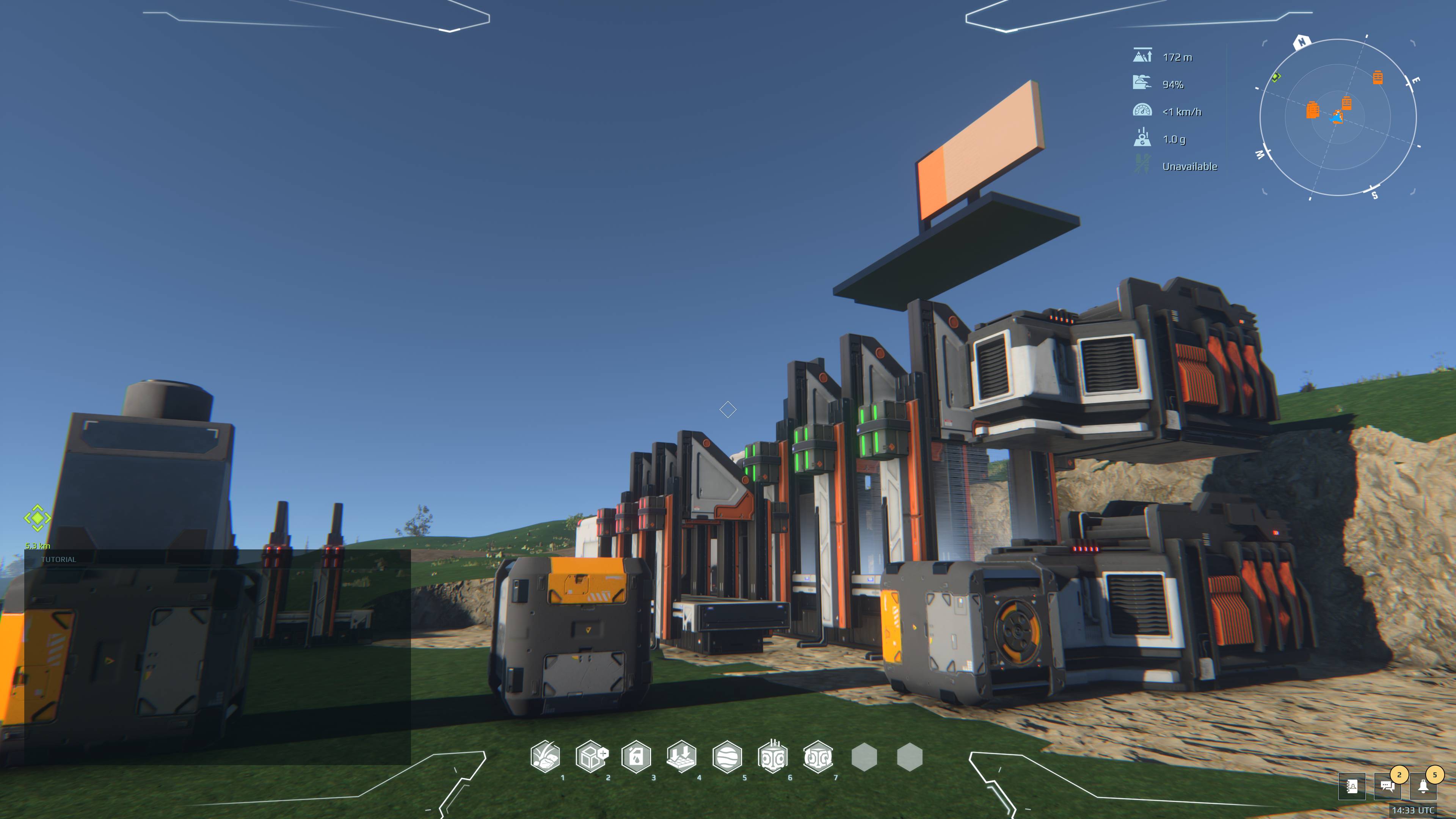
From here, you're theoretically free to do whatever you like and start building your legend within the Helios system. In practice, you'll probably corkscrew yourself into the ground figuring out what you should be doing. Dual Universe's learning curve is more of a launch trajectory, with countless interlinked systems to learn at the start of the game. Building, mining, crafting, establishing industrial pipelines, two different types of flight mechanics, the labyrinthine talent system that dictates a huge amount of what you can and cannot do within different professions. Even something as ostensibly simple as buying and selling items at the market has its own tutorial that you will need to run through.
Even something as ostensibly simple as buying and selling items at the market has its own tutorial that you will need to run through.
It's an intimidating prospect, and the great irony of it is that what you should be doing at this early stage is very simple: breaking rocks. Planets are scattered with randomly generated surface ores that can be mined with your universal multitool. These ores are the baseline through which more complex materials are developed, but they can also be sold en masse for a small but easily-attainable income. Once you've got a few hundred grand under your belt, you can purchase standalone mining units that passively mine ore and can also be calibrated roughly once a day to provide a fat chunk of ore.
The problem with doing this is that eBay doesn't exist in Dual Universe. To sell anything in the game, you must take it to market like a medieval peasant. And depending on where you initially planted your flag, your starting point could be 20, 50, even a 100 kilometres from the nearest market, which is a long trip in your starting speeder. Consequently, the opening hours of Dual Universe are a pretty miserable grind, as you drive to the market, drop off a big bag of rocks, go home, mine more rocks, and then drop those off again.
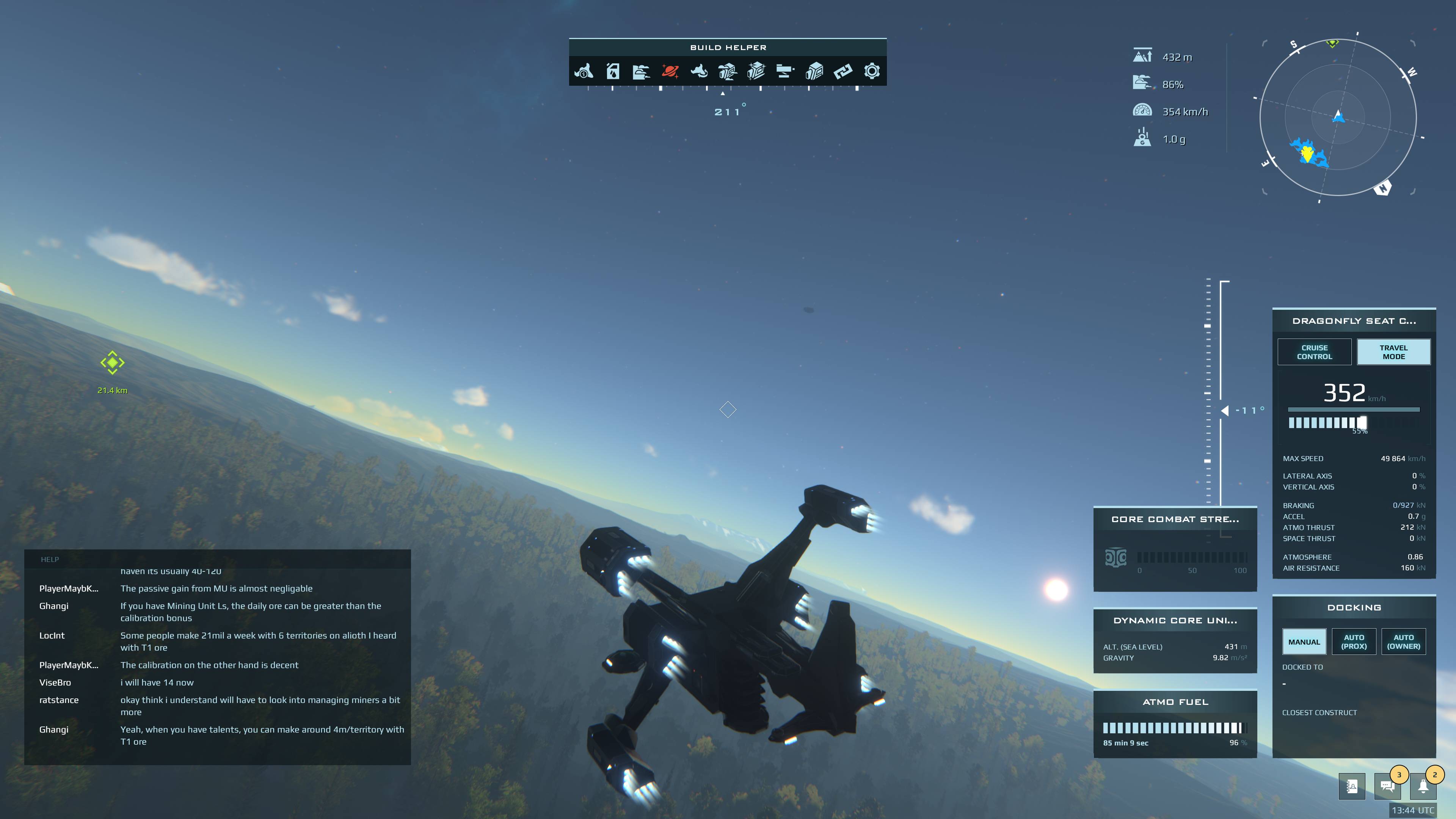
There are a couple of ways to escape from this systemic chain gang. You could buy yourself a new territory control unit and take a shuttle to the planet Alioth, where you can claim a new patch of land that has rarer and more valuable ores. But while claiming your first patch of land on a new planet is free, that land is subject to a weekly tax of 500,000 units (or two-to-four hours of surface ore mining). I don't understand why the game does this. If it's to prevent people from claiming land they don't then use, Novaquark could simply have the game deactivate their claim after, say, failing to log in for a week. Arbitrarily taxing players on imaginary land with a fictional centralised body is downright baffling.
The alternative is to use your ore in a crafting project, the results of which you can use yourself or sell on the market. But there are two issues here. First, making anything remotely useful in Dual Universe requires multiple processes, and unlike Factorio, which starts you at the beginning and methodically works you through each process, here you start with what you want to make, before working backwards to figure out how to make it, which is difficult when something as simple as a storage container has nearly a dozen nested components. Oh, and everything you craft by hand has a timer attached to it. If you want to build an assembler so you can start automating the crafting process, you're looking at about an hour's worth of crafting to go from raw materials to final product.
System shock
The other issue is that, even once you've made something, there's no guarantee you're going to be able to sell it. As I mentioned, Dual Universe's economy is driven by its players. But being a new game with a fairly small playerbase, the economy hasn't had a chance to become established yet, so it's hard to know what you should be making and where you should be selling it.
In short, every system is overwrought and difficult to grapple with. At the same time, there's a nagging sense that, despite having launched into v1.0, Dual Universe is not actually finished. The play area is currently limited to a single star-system, with the "Space" section of the game's map menu greyed-out. The planets you explore are topographically beautiful, but largely inert, with no weather systems and no fauna beyond a few pixel-shaded birds and butterflies. The handful of rudimentary delivery missions the game offers feel like a hasty attempt to compensate for the absence of any curated experiences.
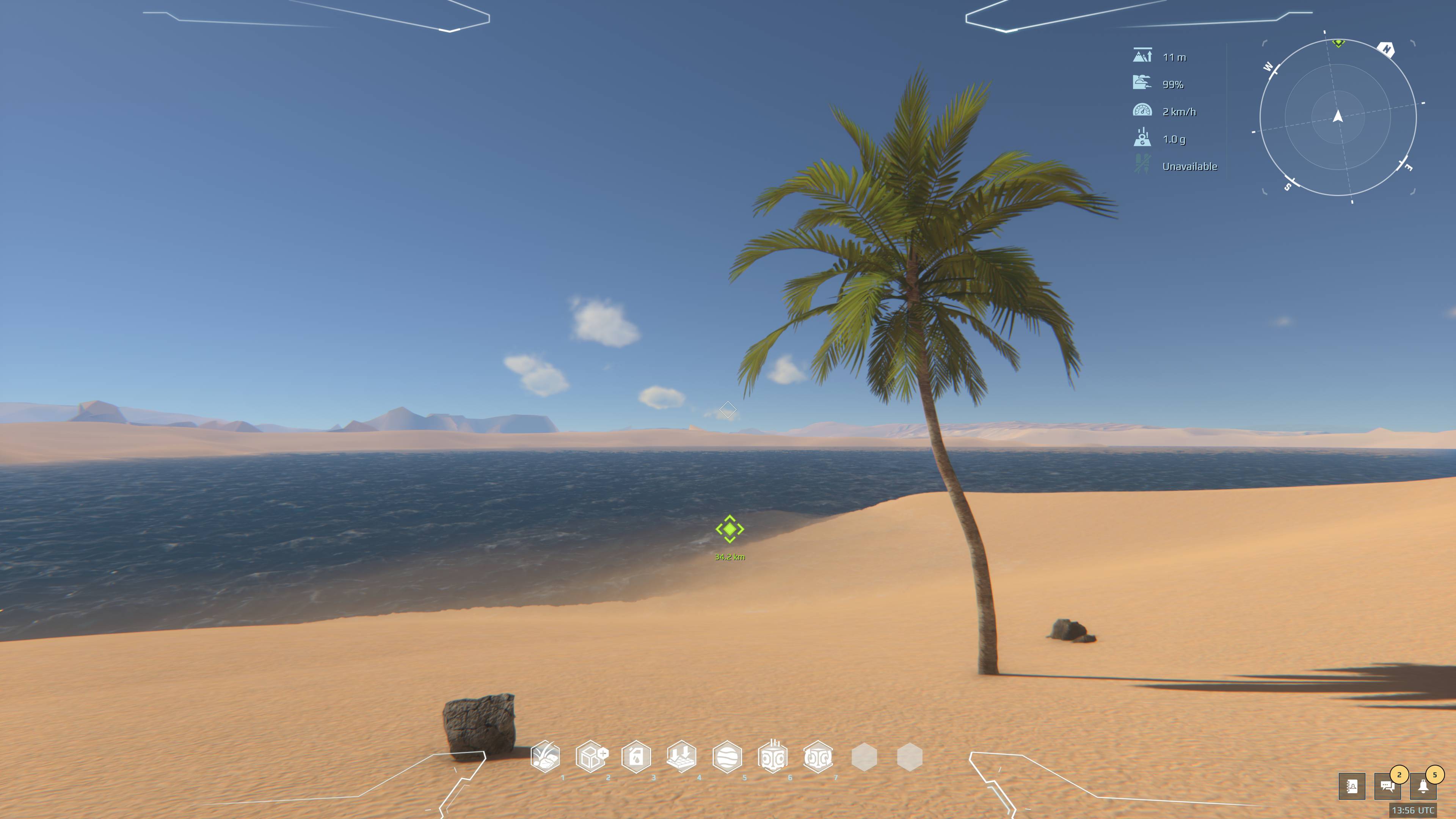
Basically, getting anything off the ground in Dual Universe is a lot of hard work and only intermittently fun. Anything, that is, except for the ships themselves. Honestly, of all the mistakes Dual Universe makes, the biggest is not immediately pointing you to your nearest ship vendor and getting you into the air as quickly as possible, because the flying in this game is splendid.
Dual Universe's flight model leans toward simulation without veering off and crashing into the control tower of realism.
Dual Universe's flight model leans toward simulation without veering off and crashing into the control tower of realism. Ships are relatively simple to control, but handling is influenced by factors like engine power, fuel-type, momentum, gravity, even the mass of the inventory you're currently carrying. Consequently, even simple hops from your home to the local market require attentive, thoughtful flying, as you need to monitor your altitude to avoid crashing into terrain, and carefully adjust your speed as you approach the landing bay, while also watching out for other player ships that may be parked or themselves landing/taking off.
Flying between planets is even better. Departing from a planet's surface is a tricky affair, as the planet's gravity tries to hold you back, while the rapidly thinning air makes it hard to maintain altitude. Get it right, though, and your speed will begin to rapidly increase from the hundreds kph into the tens of thousands. Spaceflight itself is about managing your acceleration and deceleration, as at high speeds it can take several minutes to slow down, and if you start that process too late, you'll smash into the planet like a dart.
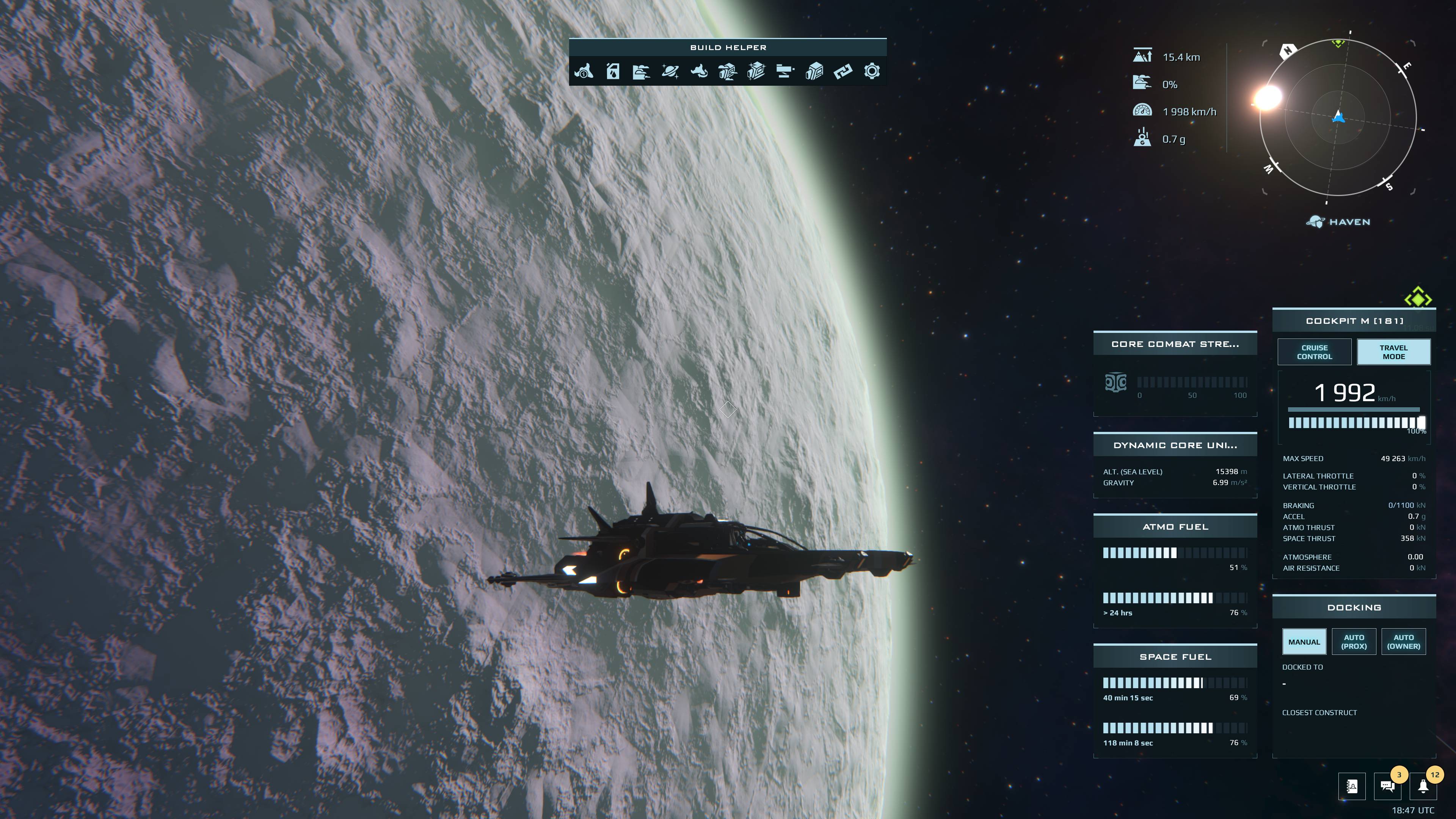
Aside from some LOD pop-in on planets, all of this is completely seamless. Indeed, it's one of the best examples of seamless space-to-planet flight that I've ever seen in a game. If you're flying a hybrid craft (which can do both space and planetary flight) for example, there's a wonderful moment when your blue-tinted atmospheric engines cut out, and your orange-coloured space thrusters slowly kick in, pushing you into the void.
Dual Universe has problems. It attempts to merge a wide array of systems, but does none of them as well as the games those ideas are borrowed from. Its difficulty curve is so steep that many players will slide off it long before they see the game at its best. Doing virtually anything requires you to go through seventeen different steps, one of which you will inevitably miss and then have to start the whole process again. But hidden underneath all that is a pleasingly tangible space sim with some powerful creation tools and a genuinely great flying experience. It's certainly not for everyone, but it's also not a write-off, and for a certain type of brain, juggling all its convolutions will be absolute catnip.
There's a decent space sim buried within Dual Universe, but you'll need to do a lot of digging to find it.
Rick has been fascinated by PC gaming since he was seven years old, when he used to sneak into his dad's home office for covert sessions of Doom. He grew up on a diet of similarly unsuitable games, with favourites including Quake, Thief, Half-Life and Deus Ex. Between 2013 and 2022, Rick was games editor of Custom PC magazine and associated website bit-tech.net. But he's always kept one foot in freelance games journalism, writing for publications like Edge, Eurogamer, the Guardian and, naturally, PC Gamer. While he'll play anything that can be controlled with a keyboard and mouse, he has a particular passion for first-person shooters and immersive sims.
